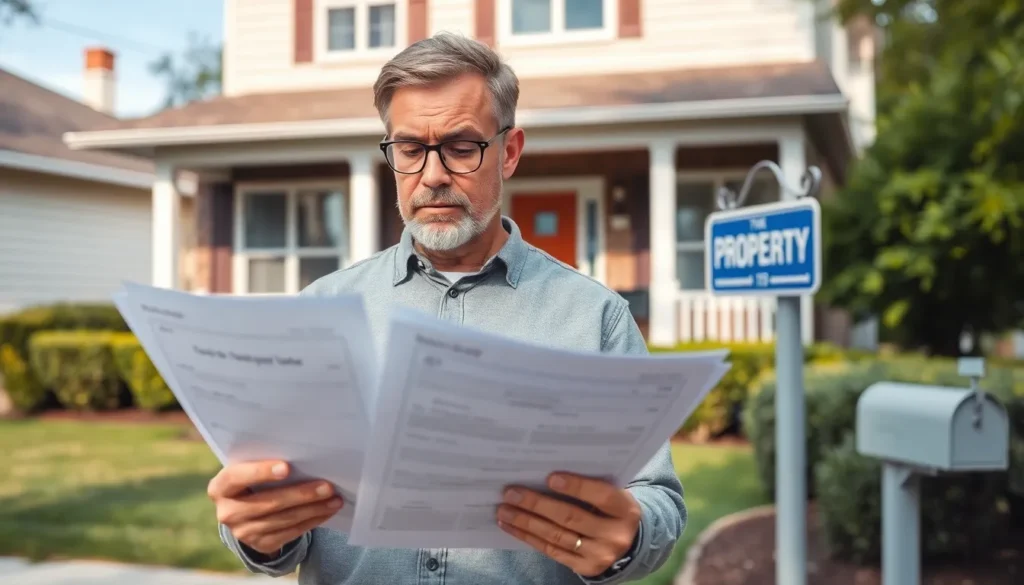Table of Contents
ToggleProperty taxes can feel like that uninvited guest who just won’t leave the party. But what if there were ways to send them packing? Understanding what makes property taxes go down is crucial for homeowners looking to lighten their financial load. From market trends to local policies, several factors can help reduce that pesky tax bill.
Understanding Property Taxes
Property taxes consist of levies imposed on real estate by local governments. Assessing the value of a property determines the amount owed annually.
Definition of Property Taxes
Property taxes represent a primary source of revenue for local governments. They facilitate funding for essential services such as public schools, emergency services, and infrastructure maintenance. Taxes typically calculate based on the assessed value of a property multiplied by the local tax rate. Local assessors determine this value using comparable sales data, property characteristics, and local market conditions. Homeowners receive property tax bills that indicate the total amount owed, and these obligations may change annually depending on property assessments and tax rate adjustments.
Importance of Property Taxes
Property taxes play a crucial role in community funding. Local governments depend on this revenue to provide basic services vital for residents. These services include waste management, public safety, and public education, directly impacting quality of life. Communities ensure sustainability, growth, and infrastructure improvements through reliable property tax collections. Participating in local governance allows taxpayers to influence decisions regarding budget allocation and service enhancements. Understanding how property taxes function empowers homeowners to navigate their financial responsibilities effectively.
Factors That Influence Property Taxes


Several factors affect property taxes, including market trends and local government decisions. Understanding these elements helps homeowners navigate their tax obligations effectively.
Market Trends
Market trends significantly impact property values. When property values decline, local assessments often reflect this change, contributing to lower property tax bills. For instance, if a neighborhood experiences decreased demand or increased inventory, assessed values drop, leading to reduced taxes. Homeowners should monitor real estate market fluctuations actively. Awareness of local housing market conditions allows property owners to anticipate changes in their tax obligations more effectively. Neighborhood revitalization efforts can also lead to changing tax assessments, impacting overall property tax rates.
Local Government Decisions
Local government decisions play a critical role in determining property tax rates. Budgetary choices by city councils and county boards directly influence tax levies. If local officials reduce funding for specific services, tax rates can decrease as a result. Homeowners can participate in local governance by attending budget meetings or engaging with their representatives. Advocating for transparency in local spending can promote responsible tax policies. Changes to tax legislation or assessment practices can also result from local government decisions, affecting overall property tax burdens.
Ways to Decrease Property Taxes
Homeowners can implement various strategies to lower their property taxes. Understanding specific avenues allows residents to effectively manage their tax burdens.
Assessment Appeals
Challenging the assessed value of a property can lead to reduced tax bills. He or she can file an assessment appeal with their local tax assessor’s office. Gather evidence, such as comparable property sales, to support the claim. Maintain detailed documentation and submit it within the specified time frame to ensure consideration. Property owners often see a significant decrease in taxes if the appeal is successful.
Exemptions and Deductions
Exploring available tax exemptions and deductions is another effective way to lower property taxes. Many states offer homestead exemptions, which reduce the taxable value of primary residences. Local governments may provide additional deductions for veterans, seniors, or disabled individuals. Homeowners should research eligibility requirements and complete the necessary applications on time. Taking advantage of these tax breaks can significantly decrease annual tax liabilities.
Economic Conditions Impacting Property Tax Rates
Economic conditions significantly affect property tax rates. Various factors play a role, including real estate market fluctuations and changes in the local economy.
Real Estate Market Fluctuations
Real estate market trends directly influence assessed property values. When home values rise, local governments often adjust tax rates to maintain revenue levels. Conversely, declining home prices can lead to lower assessments, resulting in reduced property taxes. Homeowners should stay informed about market trends. Tracking local sales data helps in understanding potential changes. Engaging with real estate professionals can provide insights into these fluctuations. Local boards may adjust tax assessments based on current market conditions to ensure fairness in taxation.
Changes in Local Economy
Local economic health impacts property tax revenues. Economic downturns result in diminished property values, affecting tax income for municipalities. Unemployment rates and business closures can lead to lower demand for housing. Homeowners may experience tax reductions during economic declines as property assessments drop. Increased development projects or improved job markets typically boost property values. Tax revenues often stabilize or increase in flourishing economies. Observing local economic indicators helps homeowners anticipate potential changes in tax rates. Engaging in community discussions on economic development can also influence local tax policies.







